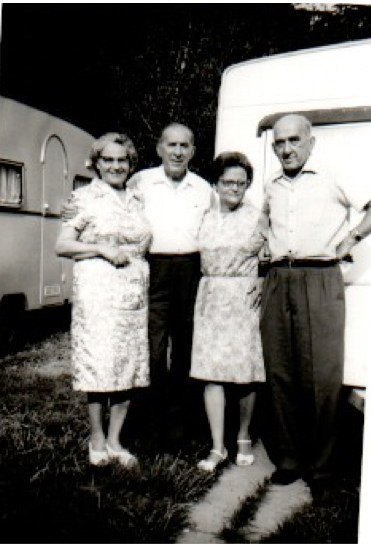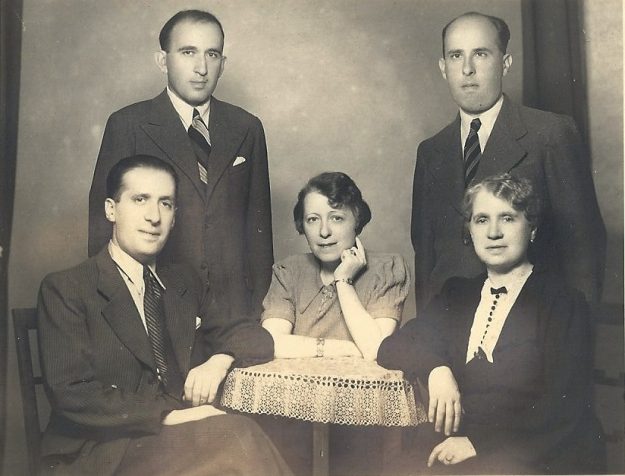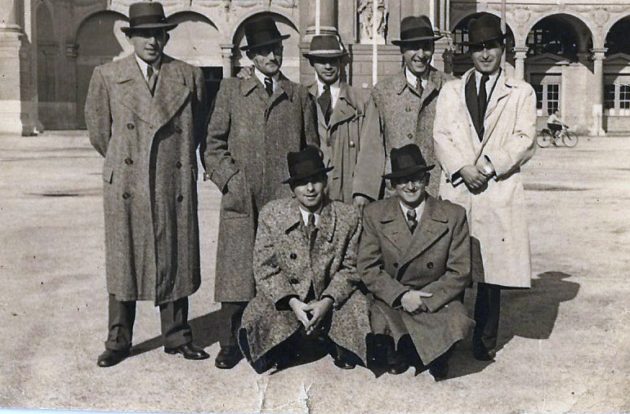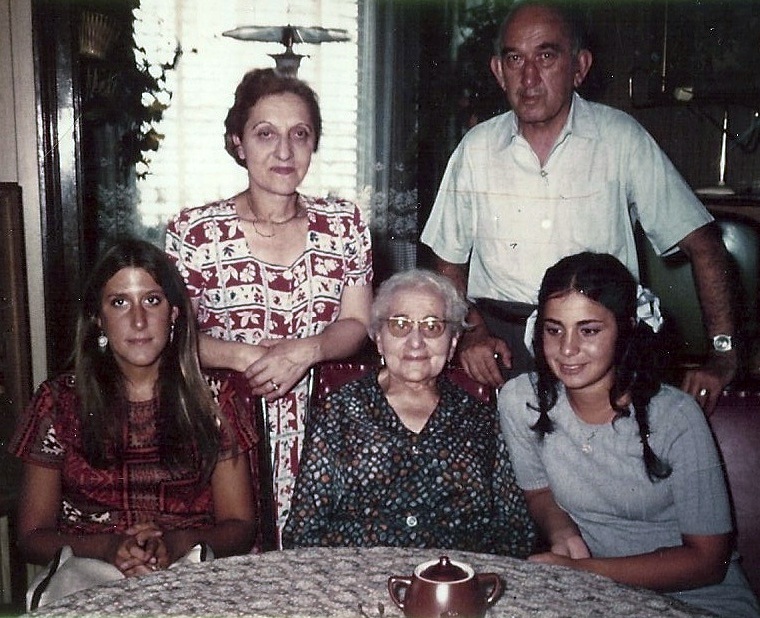
Death and destruction take their toll on families in every war. Less common to major conflicts, World War II also scattered Jewish families to the winds, robbing them of the comfort of a homeland to return to — at least not without mixed feelings.
This was one factor in the rift between my father and his only surviving sibling.
A Bit of Background

My paternal grandfather, Ignatz Jarolim, died in 1919 of bronchial pneumonia — likely a victim of the worldwide flu pandemic of 1918-20. After 1919, my grandmother Mathilda/Malvina Brown Jarolim raised four children — Edith (b. 1899), Richard (b. 1901), Paul (b. 1903) and Fritz (b. 1905) — on her own. I will be telling their stories in future posts, but suffice it to say here that only my father and my uncle Fritz survived.
In my last post, I highlighted my uncle Fritz’s military service in the French Foreign Legion and then the British Royal Pioneer Corps. Fritz, who took his mother’s maiden name and anglicized his given name to become Frederick Brown for a while, stayed in England for a few years after the war, but eventually went back to Vienna and married his childhood sweetheart, Kitty, a devout Catholic. They had no children.
Early impressions
My Uncle Fritz was the only member of the family that my father talked about — warmly, for the most part. The picture below — my favorite of all of my father’s from Vienna — show him and his brother socializing together with friends. And as the postcards and pictures in my last post indicated, they communicated frequently during the war. Their correspondence continued afterwards, and Fritz occasionally sent gifts to me and my sister, most memorably a set of stuffed mother and baby polar bears.
But I also sensed some tension in the siblings’ post-war relationship. The arrival of thin blue airmail envelopes from Austria often unleashed torrents of German from my father and mother, simmering arguments that I didn’t understand.

I eventually surmised that this tension lay behind the fact that my father and his brother didn’t see each other for decades after the war was over. But, what with my father’s reticence to speak of things relating to Vienna to his children and my unfortunate inability to eavesdrop on conversations conducted in German, I never knew the reason for it.
My one and only uncle encounter
When I planned my first backpacking trip to Europe with my Brooklyn College friend Andrea, Vienna was not at the top of my list of places to visit; neither of my parents had any kind words to say about their birth city. Suddenly, though, they were eager to have me visit the relatives who had returned to Austria after the war, my father’s brother Fritz and my mother’s aunt Mitzi and her cousin Stella. I wasn’t especially interested in meeting these older strangers on a trip that I wanted to devote to having adventures, hopefully involving boys. I nevertheless agreed to see my Viennese relatives. My parents had, after all, contributed to my European trip fund.
I wasn’t overly impressed by early 1970s Vienna, a grim city on the eastern edge of Europe that still felt the Cold War influence of the Soviet Union. It wasn’t until the later visits spurred by my family research that it began to feel like the lively world capital I’d heard praised so often (by people besides my parents). But meeting my Uncle Fritz was a highlight.
He was as intriguing as his French Foreign Legion picture. He spoke English with a British accent — a holdover, no doubt, of his stint in the Royal Pioneer Corps and subsequent years in London. I could therefore discern that he had the same wry sense of humor as my father, just conveyed with crisp British pronunciations and phrases.

I wasn’t keen on my uncle’s wife, Kitty, who was very stern looking and spoke only German. She was also very religious: A huge picture of the Madonna and child hung over the bed that Andrea and I had to share, smothered together under one of those huge down comforters for which the cold Germanic countries are famed, though this was summer. Talk about claustrophobic.
It didn’t help that I had the feeling that Kitty didn’t like me very much. What had I done to her, I wondered?
Reunion — and Post-Mortem
I like to think I broke the ice for my parents’ subsequent — and only — return visit to Vienna a few months later. In their case, of course, they knew the language, and the people they were going to see were far from strangers.

I had the impression that they all had a good time, though my mother found many things to be unhappy about and my father wasn’t one to convey his feelings about revisiting Vienna and seeing his brother again.
It was fortuitous that they made that trip. My father died suddenly, two and a half years later. No one in the family ever saw the Fritz or Kitty again.
My mother later told me that my father was angry that his brother went back to Vienna and married someone who wasn’t Jewish after all the family had been through. He stopped talking to Fritz for several years as a result — which could explain why Aunt Kitty wasn’t too thrilled to meet any of Paul’s children.
At least that was ostensible cause of their rift. I imagine it was easier for my father to focus his anger on a post-war boycott of all things Austrian than on Fritz’s inability–but, really, his own–to save their mother, sister, and third brother from the Nazi death camps.
I don’t think my father ever recovered from that guilt.

Wow….this brought back so many memories of your parents and time spent at your
house…..I love the picture of you and Andrea with your relatives….and of your
parents the following year….didn’t recall at all that they went to Europe….but at
that age we were all consumed with ourselves…..and boys…..
So interesting…..write more…..
Thanks for coming by and commenting! I spent a lot of time on that trip standing on phone lines for long distance international calls (remember those?) because Andrea wanted to call her boyfriend, who broke up with her when we got back. Ah, memories.
Wow. The other side of the story! I had seen that photo many times, now I know a little about your uncle. So many sad stories…ps whatever happened to Mitzi Schmerling? We can email or fb.
Mitzi lived with Stella and Theo in Vienna and died there in 1972 — not too long after my parents and I met her.
Very touching story, Edie, and wonderful photos. I love the one of the men in their overcoats and hats–imagine the thought they put into the exact angle at which they would wear the hat, tilted or not! So sad that we can’t ask our departed family the many questions we have now–if they would answer.
Thanks, Lydia. I think that is my favorite picture of my father — I do love the hats and also my father’s dazzling smile; I don’t think he ever looked as carefree in all the years that I knew him.